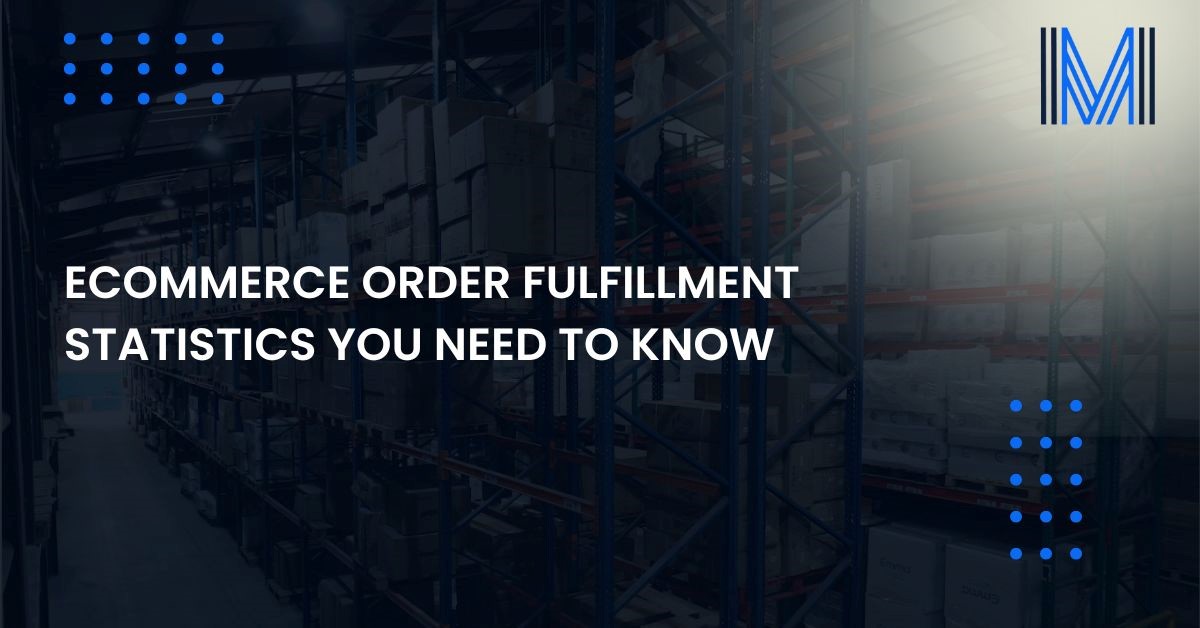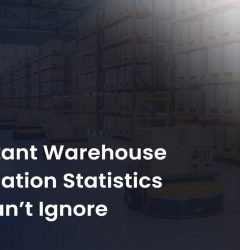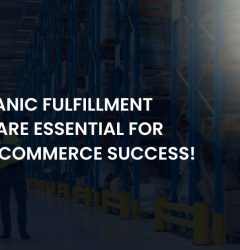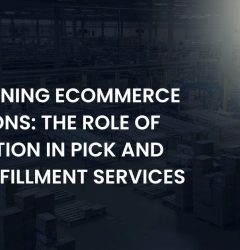13 Sep

In today’s fast-paced ecommerce world, delivering a seamless order fulfillment experience is key to winning and retaining customers. As consumer expectations rise and competition intensifies, understanding the latest trends and statistics is crucial for optimising your fulfillment operations and unlocking your online business’s full potential.
Ecommerce is growing rapidly, and there’s no sign of it slowing down anytime soon. As an online merchant, ensuring your order fulfillment strategy meets customer needs is more important than ever. With rising demand, now is the time to ensure your fulfillment processes are optimised to provide the best shopping experience possible.
Knowing the latest order fulfillment trends and statistics will help you stay ahead of the curve, meet customer expectations, and make informed decisions that can improve your operations. Whether you’re handling fulfillment in-house or outsourcing to a third party, the right strategies will help you save time, reduce costs, and grow your business.
Why Order Fulfillment Matters?
Order fulfillment is a crucial aspect of any ecommerce business. From receiving an order to shipping it to the customer, fulfillment is a multi-step process that can take up a significant portion of your resources. In-house fulfillment can be time-consuming, and many businesses now opt to outsource to fulfillment centers or warehouses to streamline operations.
Partnering with a fulfillment center allows you to save time, reduce operational costs, and focus on other aspects of your business, such as marketing and customer engagement. However, before making this decision, it’s essential to familiarise yourself with the latest statistics so that you can make the most informed choices.
General Ecommerce Statistics
Understanding the broader ecommerce landscape will help you see where order fulfillment fits into the bigger picture:
- Ecommerce is now the preferred shopping method for 75% of consumers, up from 52% in 2020 (NRF, 2023). The pandemic fundamentally changed shopping habits, leading to a surge in online purchases as lockdowns forced physical stores to close. This shift has permanently altered consumer behaviour, with most people now prefer shopping from the comfort of their homes.
- Ecommerce sales are expected to represent 21.8% of total retail sales by 2024 (eMarketer, 2023). As more consumers embrace online shopping, ecommerce is becoming an increasingly significant portion of retail. By 2024, over one-fifth of all retail sales will happen online, further highlighting the need for efficient fulfillment processes.
- Worldwide retail ecommerce is projected to grow from 19.6% in 2023 to 24.5% by 2026 (Statista, 2023). The global market share of ecommerce continues to grow, and businesses must adapt to the increasing competition. To stay competitive, ecommerce businesses must focus on offering a smooth order fulfillment process to meet customer demand.
- 95% of purchases are expected to be conducted via ecommerce by 2040 (Nasdaq, 2022). As ecommerce continues to evolve, businesses need to prepare for a future where nearly all purchases will be made online. Efficient fulfillment will be critical for meeting the demands of a fully digital economy.
- More than 2.64 billion people worldwide are expected to shop online in 2024 (Statista, 2023). With internet access becoming more widespread and mobile shopping becoming more popular, the number of online shoppers continues to rise. This creates new opportunities but also increases the pressure on businesses to deliver seamless fulfillment experiences.
- Mobile commerce will account for 73% of global ecommerce sales by 2024 (Insider Intelligence, 2023). With the rise of smartphones, mobile commerce has become a dominant force in ecommerce. Ensuring your website is mobile-friendly and optimising your fulfillment for mobile orders is essential to capturing a growing market.
- Over 85% of consumers now use social media platforms like Instagram and Facebook to discover products (Sprout Social, 2023). Social media has become an integral part of the shopping experience. Consumers use platforms like Instagram and Facebook to research products before making a purchase. To maximise sales, businesses need to integrate their e-commerce operations with social media and ensure their fulfillment processes are prepared to handle increased order volumes driven by these platforms.
- Ecommerce businesses with social media presence see 30% higher sales than those that don’t utilise social media effectively (Oberlo, 2023). The power of social media cannot be overstated. Online stores that engage with customers on social platforms tend to see significantly higher sales. By leveraging social media, e-commerce businesses can expand their reach and grow their customer base while ensuring their fulfillment processes keep up with increased demand.
Key Ecommerce Order Fulfillment Statistics
When it comes to e-commerce, understanding the landscape of order fulfillment is crucial. Here are the latest statistics you should know:
- Delivery expectations (46%) and transportation capacity (38%) remain the most significant fulfillment challenges for ecommerce businesses (Logistics Management, 2023). Customers expect fast and reliable delivery, and failing to meet these expectations can result in lost sales. Businesses must refine their fulfillment strategies to ensure timely deliveries while managing transportation logistics efficiently.
- E-commerce businesses still commonly use traditional strategies to cut costs, such as negotiating shipping rates (37%) and switching carriers (33%) (Logistics Management, 2023). Shipping costs are a major factor in an e-commerce business’s overall cost structure. Negotiating better rates with carriers and exploring alternative shipping partners can help reduce fulfillment expenses.
- 49% of ecommerce businesses are upgrading their transportation management systems (TMS) to improve logistics and reduce costs (SC Logistics, 2023). Investing in advanced transportation management software can help automate and streamline logistics operations, making tracking shipments easier, reducing errors, and lowering overall costs.
- 38% of businesses are automating parcel sortation processes to improve efficiency (Logistics Management, 2023). Sorting and packing orders are labour-intensive, but automation technology can reduce the time and resources required. Automation ensures faster fulfillment and allows businesses to keep up with increasing order volumes.
- 77% of businesses report that labour shortages have negatively impacted their order fulfillment operations (SC Logistics, 2023). Labour shortages continue to challenge fulfillment centers, causing delays and disruptions. As a result, many businesses are turning to temporary workers or outsourcing their fulfillment to external providers.
- 71% of ecommerce shoppers expect same-day or next-day delivery (Insider Intelligence, 2023). Consumer expectations for fast delivery are at an all-time high. To meet these expectations, businesses must adopt efficient fulfillment processes and, where possible, consider offering expedited shipping options.
- The global ecommerce fulfillment market is projected to reach $113 billion by 2027, growing at a compound annual growth rate (CAGR) of 9.5% (Mordor Intelligence, 2023). The ecommerce fulfillment industry is expanding rapidly as businesses outsource fulfillment to meet growing customer demand. This growth underscores the importance of having a reliable fulfillment partner to ensure smooth operations.
Combating the Labour Shortage
Approximately 51% of ecommerce businesses have raised wages to attract more workers (Logistics Management, 2023).
Labour shortages have been a persistent issue, and ecommerce businesses are feeling the impact. Raising wages is one way to draw more workers, but businesses must streamline their order fulfillment processes to reduce reliance on labour. Consider investing in automation to help ease the burden of staffing shortages and ensure a smooth fulfillment operation.
Technology’s Role in Order Fulfillment

24% of businesses felt constrained by technology limitations in the past year (Logistics Management, 2023).
The right technology is key to efficient fulfillment. Advanced software can help track orders, manage inventory, and automate key processes like sorting and packing. If your fulfillment technology is outdated, it’s time to invest in modern solutions that can help you stay competitive and meet growing customer demands.
Manufacturing and Production Proximity
50% of ecommerce businesses are considering moving production closer to their customers to reduce shipping times and costs (Logistics Management, 2023).
Relocating manufacturing to be closer to your customer base can significantly improve delivery speed and lower shipping costs. This approach helps streamline the fulfillment process, making meeting customer expectations for quick deliveries easier.
Warehouse Automation on the Rise
The global warehouse automation market is projected to grow at a CAGR of 14.1% between 2023 and 2028 (Mordor Intelligence, 2023).
Automation is transforming the order fulfillment process. From robotic picking and packing systems to AI-driven inventory management, businesses that invest in warehouse automation can significantly reduce costs and increase fulfillment efficiency.
The Pandemic’s Impact on Ecommerce Growth
34% of ecommerce businesses reported a 30% or greater increase in online sales since the start of the pandemic (Statista, 2023).
The COVID-19 pandemic dramatically shifted consumer behaviour towards online shopping. This surge has forced many businesses to rethink their fulfillment processes, focusing on speed and efficiency to meet the growing demand.
Home Delivery as a Top Purchase Driver
63% of consumers cite home delivery as a key factor in buying online (Insider Intelligence, 2023).
Convenience is king when it comes to ecommerce. Relative home delivery is essential to retaining customers and encouraging repeat purchases. Investing in an optimised fulfillment strategy can help you meet these expectations.
The Impact of Late Deliveries
45% of online shoppers are unlikely to repurchase from a store after experiencing a late delivery (Statista, 2023).
Late deliveries can seriously impact customer loyalty. It’s critical to streamline your fulfillment process to avoid delays and ensure customers receive their orders on time. One delayed order can lead to lost future sales, so efficiency is key.
The Problem of Human Error in Fulfillment
A survey by Stitch Labs found that 62% of businesses cited human error as the leading cause of inventory and fulfillment issues (Schliechtriem, 2023).
Manual processes are prone to mistakes, which can be costly regarding time and resources. Automating your fulfillment operations reduces the chance of errors and improves overall accuracy, leading to more satisfied customers.
Fast Shipping as a Key to Customer Satisfaction
62% of ecommerce merchants believe fast shipping is the most important factor in ensuring a positive customer experience (Statista, 2023).
Customers expect their orders to arrive quickly, and slow shipping can lead to dissatisfaction. Offering fast, reliable delivery can set you apart from competitors and improve customer retention.
Simplifying the Delivery Process
54% of ecommerce sellers agree that an easy delivery process is critical for customer satisfaction (Logistics Management, 2023).
A smooth and straightforward delivery process boosts customer satisfaction and increases the likelihood of repeat business. Make sure your fulfillment operations are optimised to offer hassle-free delivery options.
Importance of Providing Product Information
53% of online sellers say offering ample product information is essential to enhancing the customer experience (Schliechtriem, 2023).
Clear and comprehensive product information helps customers make informed decisions and reduces the likelihood of returns. Providing detailed product descriptions on your ecommerce site can improve customer trust and satisfaction.
The Challenge of High Delivery Costs
24.7% of merchants cite delivery costs as the biggest challenge in their supply chain (Statista, 2023).
Shipping costs can quickly add up, especially for businesses that operate internationally. To keep costs under control, work closely with logistics providers to negotiate better rates and consider local fulfillment options.
Consistency is Key to Customer Retention
A Stitch Labs survey found that 40% of businesses believe consistent, on-time delivery is the most important factor in creating lifelong customers (Schliechtriem, 2023).
Consistency in fulfilling and delivering orders on time is crucial for building customer loyalty. An efficient order fulfillment process ensures that customers receive their orders without delays, increasing their likelihood of returning to your store.
Hybrid Fulfillment Solutions
Nearly 50% of B2C businesses are opting for a hybrid fulfillment solution, outsourcing some processes while handling others in-house (Logistics Management, 2023).
A hybrid approach to fulfillment allows businesses to maintain control over certain aspects of the process while benefiting from the expertise of fulfillment providers for other tasks. This flexibility can help reduce costs and improve overall efficiency.
The Shift Toward Outsourcing
According to a DHL report, 40% of companies are currently insourcing fulfillment, but 6% are planning to switch to outsourcing, and 18% are likely to outsource in the future (DHL, 2023) fully.
Outsourcing fulfillment is becoming an increasingly popular solution for ecommerce businesses looking to reduce overhead and improve scalability. By partnering with an expert fulfillment provider, businesses can focus on growth and customer acquisition while leaving logistics to the experts.
Do You Want to Outsource Your Ecommerce Order Fulfillment?

Order fulfillment can be one of the most time-consuming and labour-intensive aspects of running an ecommerce business. The process requires significant resources and attention to detail, from managing inventory to picking, packing, and shipping.
Outsourcing your fulfillment operations to a specialized company like Meteor Space can help streamline these processes, allowing you to focus on growing your brand. Meteor Space offers bespoke fulfillment solutions, including international shipping, advanced inventory management, and fast order processing. With over 200,000 square feet of warehouse space, we’re equipped to handle your ecommerce fulfillment needs efficiently and affordably.
Want to learn more about how Meteor Space can help your business scale through expert order fulfillment services? Contact us today to speak with our team of fulfillment experts!


